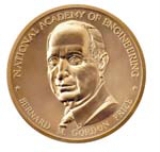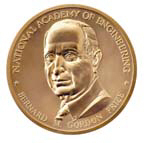
Gordon Prize
Encyclopedia

Engineering
Engineering is the discipline, art, skill and profession of acquiring and applying scientific, mathematical, economic, social, and practical knowledge, in order to design and build structures, machines, devices, systems, materials and processes that safely realize improvements to the lives of...
. Each year, the Gordon Prize awards $500,000 to the grantee, of which the recipient may personally use $250,000, and his or her institution receives $250,000 for the ongoing support of academic development. Although the Gordon Prize is relatively new, within engineering education, it is viewed by many to be the American equivalent of the Nobel Prize
Nobel Prize
The Nobel Prizes are annual international awards bestowed by Scandinavian committees in recognition of cultural and scientific advances. The will of the Swedish chemist Alfred Nobel, the inventor of dynamite, established the prizes in 1895...
.
History
Upon earning a B.S.Bachelor of Science
A Bachelor of Science is an undergraduate academic degree awarded for completed courses that generally last three to five years .-Australia:In Australia, the BSc is a 3 year degree, offered from 1st year on...
and M.S.
Master of Science
A Master of Science is a postgraduate academic master's degree awarded by universities in many countries. The degree is typically studied for in the sciences including the social sciences.-Brazil, Argentina and Uruguay:...
in Electrical Engineering
Electrical engineering
Electrical engineering is a field of engineering that generally deals with the study and application of electricity, electronics and electromagnetism. The field first became an identifiable occupation in the late nineteenth century after commercialization of the electric telegraph and electrical...
from MIT, Mr. Gordon worked on the development of UNIVAC
UNIVAC
UNIVAC is the name of a business unit and division of the Remington Rand company formed by the 1950 purchase of the Eckert-Mauchly Computer Corporation, founded four years earlier by ENIAC inventors J. Presper Eckert and John Mauchly, and the associated line of computers which continues to this day...
, the world’s first commercial digital computer. He subsequently co-founded EPSCO, Inc. where the original Datrac high-speed A/D converter was developed and applied to myriad pioneering digitizing and signal processing applications.
Considered the “father of high-speed solid-state analog to digital conversion” for his inventions and contributions to signal translation, medical tomography and other high-precision instrumentation, Bernard M. Gordon has more than 200 patents worldwide. Mr. Gordon is a founder of NeuroLogica Corporation, a neuroscience-based medical imaging company in Danvers, Massachusetts
Danvers, Massachusetts
Danvers is a town in Essex County, Massachusetts, United States. Located on the Danvers River near the northeastern coast of Massachusetts, Danvers is most widely known for its association with the 1692 Salem witch trials, and for its famous asylum, the Danvers State Hospital.-17th century:The land...
that focuses on conceiving, developing, manufacturing and marketing advanced medical imaging equipment. He founded Analogic Corporation
Analogic Corporation
Analogic is an American multinational corporation. Analogic Corporation currently employs 1,200 employees worldwide with approximately 400 working at the main facility and headquarters in Peabody, Massachusetts.-History:...
and retired as Chairman of the Board. Prior to Analogic, he was the President and co-founder of Epsco, Incorporated.
In 1986, Mr. Gordon received the National Medal of Technology
National Medal of Technology
The National Medal of Technology and Innovation is an honor granted by the President of the United States to American inventors and innovators who have made significant contributions to the development of new and important technology...
from President Ronald Reagan
Ronald Reagan
Ronald Wilson Reagan was the 40th President of the United States , the 33rd Governor of California and, prior to that, a radio, film and television actor....
, and in 1991, he was elected a member of the National Academy of Engineering
National Academy of Engineering
The National Academy of Engineering is a government-created non-profit institution in the United States, that was founded in 1964 under the same congressional act that led to the founding of the National Academy of Sciences...
. Mr. Gordon is the recipient of several honorary engineering doctoral degrees, is a Professor of Medical Engineering at MIT, endows the Bernard Marshall Gordon Professorship of Engineering Innovation and Practice at MIT, and is a founder of the Gordon Institute, a graduate-level institution dedicated to teaching engineering leadership.
Mr. Gordon was elected to the Tufts Board of Trustees in 1996 and currently serves on the Committee for University Advancement, the Audit Committee, and the Board of Overseers for the School of Engineering. In 1992, the Gordon Institute, which Mr. Gordon founded to develop and train promising engineers to become exceptional engineering leaders, became affiliated with Tufts University. It has since become one of the university’s signature programs.
Selection criteria
- The nominee's ability to develop educational paradigms that create and develop engineering leadership skills and attitudes. Among the contemporary areas needing emphasis are: communication skills; teamwork skills; “hands-on” experience; innovative capacity; inventiveness and “drive”; ability to share, access, and interpret large volumes of information; and an interdisciplinary focus.
- Demonstrated impact on the above-cited emphasis areas and the transferability of the innovation. Additional criteria can include demonstrated effect on prior students (proportion of students pursuing careers in industry, active engagement in elective student design opportunities, pursuit of advanced engineering education, etc.), student evaluation of relevant courses, and peer recognition of the uniqueness of the new teaching approach.
- Significant impact within the institution and/or replication at other institutions.
- Emphasis on project success.
- Success in producing engineering leaders - nominators should identify individuals who have benefited from the innovation, including their past and present positions.
- The potential of the nominee(s) to utilize the recognition and resources conferred by the prize to enhance and extend the innovative approach, including (but not limited to) replication of the innovation within other academic settings.
Recipients
- 2011 Edward Crawley from MIT for cofounding the CDIO initiative, by innovating and rethinking engineering education. CDIO currently has over 50 collaborators worldwide.
- 2009 Thomas H. Byers and Tina Seelig for pioneering, continually developing, and tirelessly disseminating technology entrepreneurship education resources for engineering students and educators around the world. (STVP Program at Stanford University)
- 2008 Jacquelyn F. Sullivan and Lawrence E. Carlson for the Integrated Teaching and Learning Program that infuses hands-on learning throughout K-16 engineering education to motivate and prepare tomorrow's engineering leaders.
- 2007 Arthur W. Winston, Harold S. Goldberg, and Jerome E. Levy for innovation in engineering and technology education. They were founders and lecturers at the Gordon Institute during its early years.
- 2006 Jens E. Jorgensen, John S. Lamancusa, Lueny Morell, Allen L. Soyster, and Jose Zayas-Castro, for creating the Learning Factory, where multidisciplinary student teams develop engineering leadership skills by working with industry to solve real-world problems.
- 2005 Edward J. Coyle, Leah H. JamiesonLeah JamiesonLeah H. Jamieson is an American engineering educator serving at present as the John A. Edwardson Dean of Engineering and Ransburg Distinguished Professor of Electrical and Computer Engineering at Purdue University...
and William C. Oakes for innovations in the education of tomorrow's engineering leaders by developing and disseminating the Engineering Projects in Community Service (EPICS) program. - 2004 Frank S. Barnes for pioneering an Interdisciplinary Telecommunications Program (ITP) that produces leaders who bridge engineering, social sciences, and public policy.
- 2002: Eli FrommEli FrommEli Fromm is the Roy A. Brothers University Research Professor and Director of the Center for Educational Research at Drexel University. He is a member of the Department of Electrical & Computer Engineering. Professor Fromm received a B.S...
for innovation that combines technical, societal, and experiential learning into an integrated undergraduate engineering curriculum.

